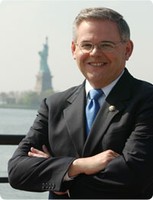Menendez Leads Virtually Unknown Opponent Kyrillos in Race for U.S. Senate Seat, Rutgers-Eagleton Poll Finds
Statewide, New Jersey voters support Democrats for U.S. House

Kyrillos’ primary weakness is that few voters know him; 80 percent either have no opinion (50 percent) or are unsure (30 percent) about the GOP challenger. Eleven percent have a favorable impression and 9 percent do not.
Voters feel more positive toward Menendez, 37 percent to 24 percent, but nearly 40 percent have no opinion about the incumbent. “Menendez’s favorability numbers crept up slightly early last year, but for an incumbent, he has a very low profile,” said poll Director David Redlawsk, a professor of political science at Rutgers University. “Kyrillos, however, is completely unknown at this point, a huge advantage for Menendez. We certainly expect that the numbers will tighten as the campaign develops, but Menendez starts off in a good position.”
Democrats also hold a significant lead over Republicans statewide in an early 2012 U.S. House election ballot test, according to the poll. Statewide, 45 percent of registered voters would support an unnamed Democrat, 28 percent would vote Republican, 11 percent would not vote and 15 percent are unsure.
Results are from a poll of 914 registered voters conducted statewide among both landline and cell phone households from Feb. 9-11. The full sample has a margin of error of +/- 3.3 percentage
points. Questions about the U.S. Senate and House elections were split into two random subsamples, with a margin of error of +/- 4.6 percentage points for each.
Even Republicans don’t know Kyrillos
While the state’s voters tend to lean Democratic in national elections, Kyrillos is at a particular disadvantage, suffering from virtually no name recognition nine months before the election. Only 20 percent of voters venture an opinion (11 percent favorable and 9 percent unfavorable). Even among Republicans, few know how they feel about the state senator: 12 percent are favorable, 4 percent unfavorable, but 84 percent have no opinion.
“No name recognition is a double whammy for Kyrillos,” said Redlawsk. “He must overcome the lack of a statewide profile and the underlying Democratic leanings of voters. Neither is impossible to do, with enough time and enough money, but it is a clear challenge.”
That Kyrillos’ lack of name recognition is a drag on his candidacy against Menendez is reflected by a party name ballot test for the Senate, where half of the poll’s respondents were asked to pick a Democrat or Republican for the seat. Among those with this option, a generic Democrat beats a generic Republican by only 12 percentage points, with 18 percent unsure. When the matchup is described as Kyrillos versus Menendez, the Democrat’s lead grows to 22 points. However, 33 percent say they would not vote or they cannot decide.
“Given a partisan cue – vote for a Republican or a Democrat – voters can express their generic preference pretty easily,” noted Redlawsk. “Asking them to choose between candidates they don’t know well leaves more room for uncertainty.”
Menendez rating stable and favorable, but lots of ‘no opinion’
Although an incumbent up for re-election, Menendez continues to have a surprisingly low profile: 39 percent of respondents have either no opinion of him (32 percent) or don’t know (7 percent). Thirty-seven percent feel favorably and 24 percent do

“Without a sense of the candidates as individuals, voters are likely to fall back on party cues,” said Redlawsk. “This gives Kyrillos the opportunity to define Menendez, which could make the race more competitive by November. But first Kyrillos has to make himself known.”
Independents are particularly unsure where they will go at this point, said Redlawsk. Those asked to vote for an unnamed Republican or Democrat split evenly at 32 percent, but 37 percent would not choose one party over the other. Given named candidates, independents swing heavily to the name they recognize better: 43 percent would vote for Menendez, 23 percent for Kyrillos, and 34 percent are undecided or would not vote.
Democratic lead in statewide U.S. House test
To examine the 2012 U.S. House race, one-half of respondents chose between a Republican and a Democrat, while the other half was asked to choose between their “current congressman” and a “challenger running against him.”
In the party name test, 45 percent of registered voters pick a Democrat while 28 percent say they would vote GOP. Another 11 percent would not vote, and 15 percent are uncertain. Asked to choose the incumbent or challenger, voters are more ambivalent, with 30 percent choosing the officeholder and 27 percent preferring the opponent. Given this choice, 20 percent would not vote, and 23 percent could not make a choice.
“For perspective, two years ago when we asked these same questions, 33 percent picked a Democrat and 31 percent wanted a Republican,” said Redlawsk. “These results suggest a shift towards the Democrats, much of which is driven by independents, who were 2-to-1 for Republicans in February 2010, and are now leaning slightly Democratic.”
Redlawsk also noted that the desire for challengers is not much different now than two years ago, when 32 percent supported their “current congressman” and 25 percent preferred someone else. As the 2010 election progressed, voters shifted slightly toward challengers in the polling, but in the end re-elected all but one of the state’s incumbents.
While noting that getting an early read on where the electorate is for 2012 provides a sense of the political environment, early numbers give only some guidance for the fall. “I would caution against reading too much into this,” said Redlawsk. “It’s early, for one thing. And whether a voter wants to throw out an incumbent, or wants a candidate of one party or the other, it really doesn’t matter if there isn’t a strong alternative to the incumbent on the ballot.”
Media Contact: David Redlawsk
732-932-9384, ext. 285
E-mail: redlawsk@rutgers.edu